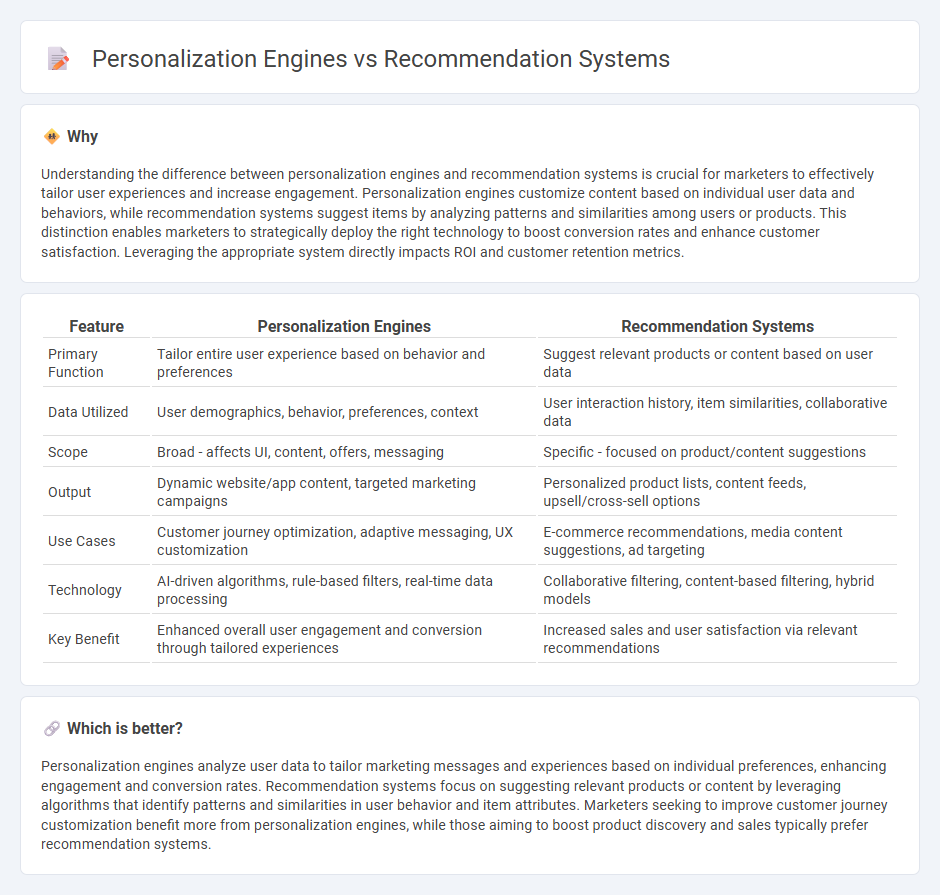
Personalization engines analyze user data to deliver tailored content, enhancing engagement by predicting individual preferences across multiple channels. Recommendation systems focus on suggesting relevant products or services based on behavioral patterns and historical interactions, driving conversions through targeted suggestions. Explore how leveraging these technologies can transform your marketing strategy and boost ROI.
Why it is important
Understanding the difference between personalization engines and recommendation systems is crucial for marketers to effectively tailor user experiences and increase engagement. Personalization engines customize content based on individual user data and behaviors, while recommendation systems suggest items by analyzing patterns and similarities among users or products. This distinction enables marketers to strategically deploy the right technology to boost conversion rates and enhance customer satisfaction. Leveraging the appropriate system directly impacts ROI and customer retention metrics.
Comparison Table
| Feature | Personalization Engines | Recommendation Systems |
|---|---|---|
| Primary Function | Tailor entire user experience based on behavior and preferences | Suggest relevant products or content based on user data |
| Data Utilized | User demographics, behavior, preferences, context | User interaction history, item similarities, collaborative data |
| Scope | Broad - affects UI, content, offers, messaging | Specific - focused on product/content suggestions |
| Output | Dynamic website/app content, targeted marketing campaigns | Personalized product lists, content feeds, upsell/cross-sell options |
| Use Cases | Customer journey optimization, adaptive messaging, UX customization | E-commerce recommendations, media content suggestions, ad targeting |
| Technology | AI-driven algorithms, rule-based filters, real-time data processing | Collaborative filtering, content-based filtering, hybrid models |
| Key Benefit | Enhanced overall user engagement and conversion through tailored experiences | Increased sales and user satisfaction via relevant recommendations |
Which is better?
Personalization engines analyze user data to tailor marketing messages and experiences based on individual preferences, enhancing engagement and conversion rates. Recommendation systems focus on suggesting relevant products or content by leveraging algorithms that identify patterns and similarities in user behavior and item attributes. Marketers seeking to improve customer journey customization benefit more from personalization engines, while those aiming to boost product discovery and sales typically prefer recommendation systems.
Connection
Personalization engines leverage user data, behavior, and preferences to deliver tailored content and experiences in marketing. Recommendation systems function as a core component of these engines by analyzing patterns and suggesting relevant products or services to individual users. Together, they enhance customer engagement, increase conversion rates, and drive targeted marketing strategies.
Key Terms
Algorithms
Recommendation systems leverage algorithms such as collaborative filtering, content-based filtering, and matrix factorization to predict user preferences and suggest relevant items. Personalization engines use these algorithms alongside user behavior data, contextual information, and machine learning models to create tailored experiences beyond simple recommendations. Explore how these algorithmic approaches shape user engagement and business growth.
User Profiling
Recommendation systems utilize user profiling by analyzing behavioral data and preferences to suggest relevant content or products, enhancing user engagement and satisfaction. Personalization engines take user profiling further by integrating real-time interactions, contextual information, and predictive analytics to deliver highly tailored experiences across multiple channels. Discover how advanced user profiling techniques differentiate recommendation systems and personalization engines in driving user-centric solutions.
Content Filtering
Recommendation systems and personalization engines both use content filtering techniques to enhance user experience by analyzing item attributes and user preferences. Content filtering in recommendation systems primarily involves filtering items based on similarity metrics such as keywords or categories, while personalization engines leverage deeper user behavior insights to tailor content more precisely. Explore how advanced content filtering strategies can transform user engagement by learning more about their applications and benefits.
Source and External Links
What is a Recommendation System? | Data Science | NVIDIA Glossary - A recommendation system is an AI algorithm that uses machine learning and Big Data to suggest products to consumers based on various criteria.
What Are Recommender Systems? - Coveo - A recommender system uses machine learning and data filters to organize search results and deliver relevant content and products to users.
Recommender system - Wikipedia - Recommender systems are particularly useful when an individual needs to choose an item from a vast number of options provided by a service.
 dowidth.com
dowidth.com